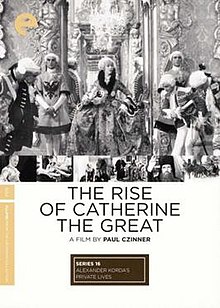Catherine the Great (1934 film)
| The Rise of Catherine the Great | |
|---|---|
 |
|
| Directed by | Paul Czinner |
| Produced by |
Alexander Korda Ludovico Toeplitz (uncredited) |
| Written by |
Marjorie Deans Arthur Wimperis |
| Starring |
Elisabeth Bergner Douglas Fairbanks Jr. Flora Robson |
| Narrated by | Alexander Kerensky |
| Music by | (uncredited) Irving Berlin |
| Cinematography | Georges Périnal |
| Edited by | Stephen Harrison Harold Young |
| Distributed by | London Films/United Artists |
|
Release date
|
|
|
Running time
|
94 minutes |
| Country | United Kingdom |
| Language | English |
The Rise of Catherine the Great (also titled Catherine the Great) is a 1934 British historical film based on the play The Czarina by Lajos Bíró and Melchior Lengyel, about the rise to power of Catherine the Great. It was directed by Paul Czinner, and stars Elisabeth Bergner as Catherine, Douglas Fairbanks, Jr., as Grand Duke Peter, Dorothy Hale as Countess Olga, and Flora Robson as Empress Elizabeth.
This historical drama recounts the events that led to the accession of Catherine the Great, Empress of all the Russias. The film opens with the arrival in 1744 of Princess Sophie Auguste Frederika – whose name would be changed to ‘Catherine’ – from her father’s court of Anhalt-Zerbst (in modern Germany) to the court of the Empress Elizabeth. "Little Catherine" is to marry the Grand Duke Peter, nephew and heir presumptive of the unmarried and childless Empress Elizabeth.
Peter already displays signs of mental instability and a sharply misogynist streak. He rejects Catherine on their wedding night, reacting to something innocently said by his French valet, claiming that she used feminine tricks to win him over. In time, though, Peter accepts her and they have a happy marriage for a while. Meanwhile, Catherine gains important experience of government from working as principal aide to the empress.
The empress dies and Peter becomes tsar, but his mental illness is starting to get the better of him, along with sheer boredom in the job. Catherine still loves him despite beginning a very public love affair with one of her best friends – until one night when Peter goes one step too far in publicly humiliating his wife. She ceases to love him, which enables her to be clear-headed in supporting a planned coup d'état. The following morning, he is arrested and Catherine is made Empress of All the Russias.
The elevation is marred by Peter’s murder that very morning, contrary to Catherine’s command. Grigory Orlov explains that everything has a price, and the crown has the highest price of all. The film ends, with Catherine in tears on her throne, while the cheers of the crowds are heard outside.
...
Wikipedia
